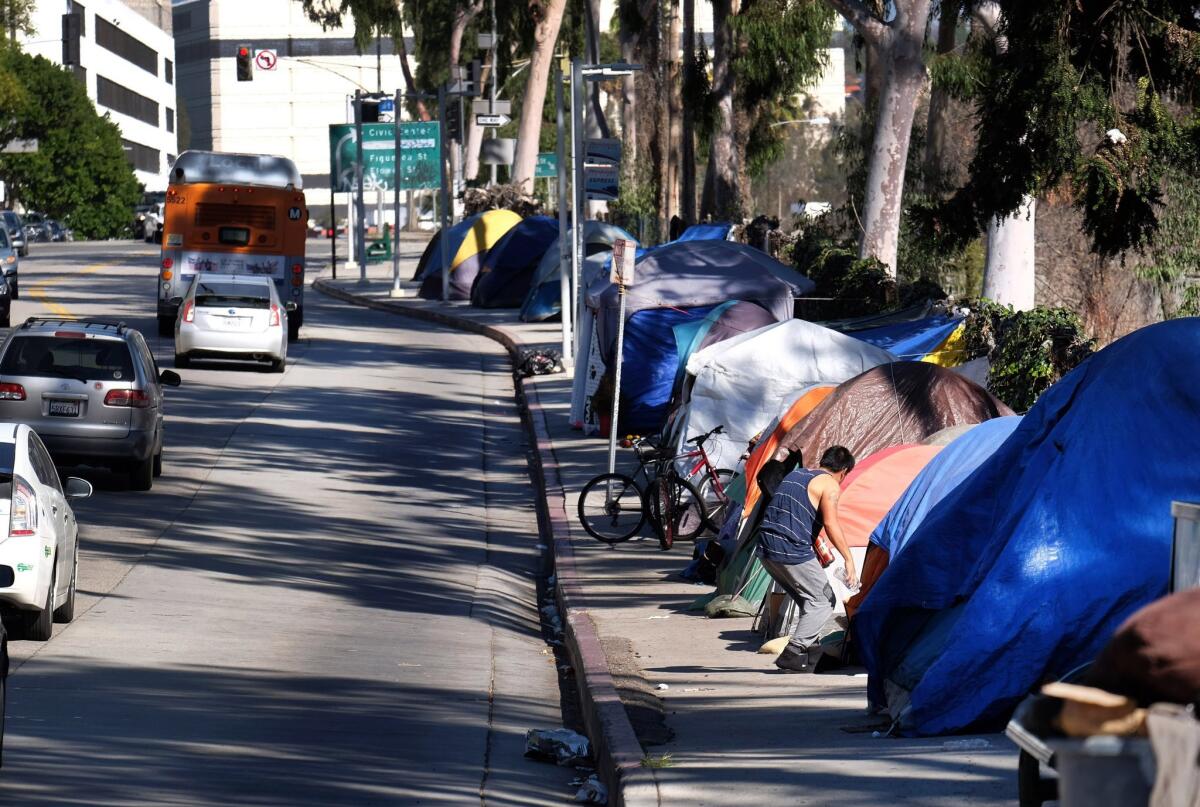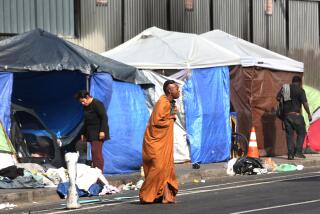To fight coronavirus, turn homeless outreach workers into public health officers

- Share via
With the broader spread of the coronavirus now inevitable, the implications for the homeless are becoming more alarming. This is especially true for California, which currently has more than one-fifth of the coronavirus cases reported nationwide and half of the country’s street homeless population.
Homelessness has long been framed as a public health challenge. Encampments in California have reported high rates of hepatitis C (spread by sharing needles) and diseases such as typhus and hepatitis A. In some encampments, life resembles conditions in pre-modern eras, prior to the construction of water and sanitation systems.
Contrary to the impression of many conservatives, governments in California do not welcome encampments and regularly move to dismantle them, with public health being a leading justification. But if dealing effectively with encampments is a condition of containing the coronavirus among the homeless, cities may face a tough road ahead.
Despite increasing funding for programs to fight homelessness and endless public discussion of the problem, San Francisco experienced an increase in encampments in 2019. Civil liberties groups have sought strong protections over matters such as the disposal of homeless people’s personal property, which has stopped governments from moving quickly on encampments. Cities’ powers to regulate sleeping on the street were sharply limited by the U.S. 9th Circuit Court of Appeals’ 2018 decision in City of Boise vs. Martin. To prevent the coronavirus from spreading faster, officials have to move as quickly as possible.
COVID-19, the illness caused by the coronavirus, is said to be most dangerous for people with underlying health problems. That certainly describes people living on the street. Numerous studies have documented how homeless individuals have more health problems than ordinary Americans, and many of their serious health problems persist after they are placed in shelters and even permanent housing programs. A coronavirus outbreak in a shelter or supportive housing facility could prove as deadly as the crisis at the Life Care Center facility in Kirkland, Wash.
At this point, protecting the homeless requires a strong public education push. Most Americans are getting hourly updates on coronavirus developments on their phones and computers. But that is not necessarily true for the homeless population or formerly homeless, many of whom are very isolated. Their isolation also means they may not be getting the message of the importance of aggressive hand washing and the rest of the CDC’s coronavirus guidelines.
That means we should ensure that homeless people become “high utilizers” of public health resources. Despite already having been in triage mode on homelessness for years now, governments will need to take extra efforts, and devote additional staffing resources, to prevent and contain the spread within the homeless population.
Necessity is the mother of honesty, or it should be. Just as school closures are forcing us to see the degree to which K-12 education is critically important for working parents, officials should carefully scrutinize homeless services to determine what could be redeployed toward coronavirus care and prevention.
Some government spending on homelessness unquestionably has less to do with effectiveness than showing the public you’re “doing something.” Outreach to the street population, for example, is substantially public relations. The public appreciates seeing social workers out and about trying to connect homeless people with services, but most homeless people know how to locate the nearest drop-in center without being directed to it by an outreach worker.
Local governments should immediately recommission their homeless outreach workers to act as public health servants and insist that homeless people raise their personal hygiene standards like everyone else is being urged to do. In many places, the homeless population has no ready access to bathrooms, showers and laundry facilities to improve their hygiene. In the near term, governments are going to have to focus on the immediate and wide distribution of whatever resources they have, such as hand sanitizer and portable hand washing stations.
But even with more access to hygiene resources, many in the homeless community may be less disposed to follow public health guidelines due to factors such as mental illness or plain stubbornness, despite it being in their interest to do so.
Front line social workers, with long experience with the challenge of “service resistance,” will understand that priority must be placed on ensuring that they use available resources. Savvy social workers know how to recruit the assistance of some of the more functional members of the homeless population, who are often better positioned to influence their peers than anyone associated with the government.
Obviously, governments must provide quarantine options for those who can’t self-quarantine at home and pressure will have to be brought to bear to make sure people use those options if deemed necessary by public health authorities.
In much of the debate around the coronavirus and the homeless population, progressive commentators have emphasized the need for affordable housing, while conservative commentators have focused on reducing public disorder.
Both points are legitimate, but neither is particularly germane to the immediacy of this health crisis. The government’s ability to prevent COVID-19 from taking hold in the vulnerable homeless population will be a test of how much it can, at least for the time being, dial down the ideology.
Stephen Eide is a senior fellow at the Manhattan Institute and contributing editor of City Journal.
More to Read
A cure for the common opinion
Get thought-provoking perspectives with our weekly newsletter.
You may occasionally receive promotional content from the Los Angeles Times.









